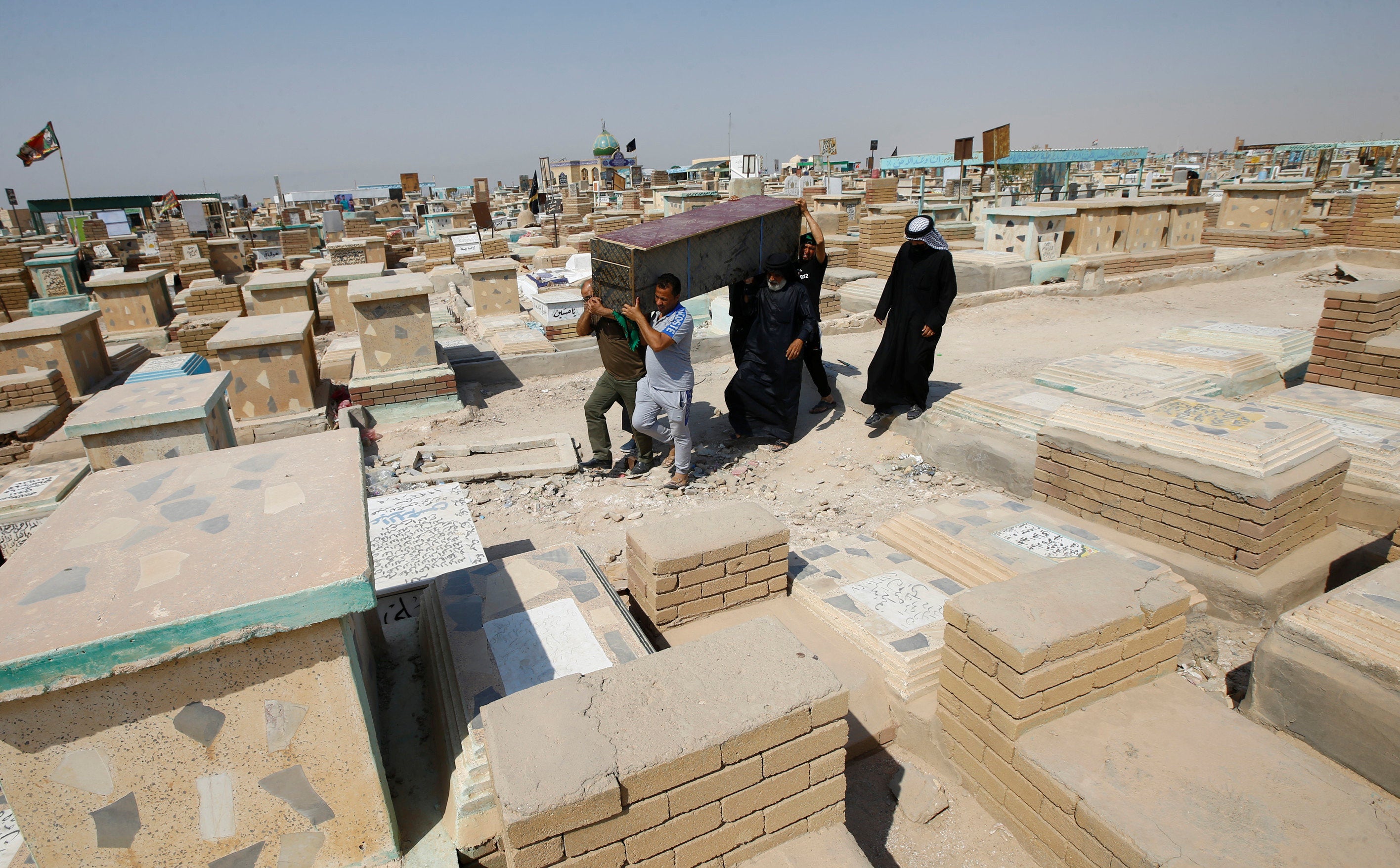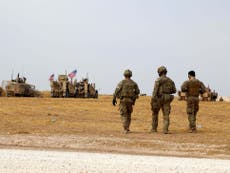Coronavirus, corruption, Isis and politics – Iraq battered by perfect storm of crises
Covid-19 is only one of multiple threats to life and livelihoods that confront Iraqis, writes Patrick Cockburn


I am safe,” writes a friend in Baghdad, “and I have not been infected by the virus until now, but almost everybody else is infected.” The coronavirus epidemic is sweeping through Iraq as its medical system collapses and many Iraqis assume fatalistically that they cannot escape the illness.
“No one cares about infection anymore,” continues the friend, though this indifference does not apply to herself as she mostly stays at home. “The majority do not wear a mask, especially in poor areas,” she says. “The most important thing for them is to work [in order] to make a living. The hospitals are full and the government is not interested in increasing their number.” More than 8,000 Iraqis have died and 300,000 have been infected by coronavirus according to the Iraqi Health Ministry, though eyewitnesses say that the real number is far higher.
The health system was already a wreck before the epidemic began because of the impact of 40 years of under-funding and under-staffing. Many doctors, a frequent target of kidnappers, have fled abroad. Curfews and lockdowns during the summer were often ignored in the cram-packed housing of Iraqi cities. In addition, some 60 per cent of Iraqis are aged under 25 and have less to fear, even if they do contract the virus.
Among those who do manage to find a bed in a hospital, conditions can be grim and not just because of the illness. Patients may go hungry because the hospital cannot afford to feed them while “their family members are prevented [because of the risk of infection] from entering the hospital in order to bring them food”. The better off are receptive to myths about the effectiveness of unproven but expensive medications such as blood plasma.
Iraq is seeking to stem the further spread of the illness during the Shia pilgrimage of Arbaeen to the holy city of Kerbala in early October. This normally attracts millions of pilgrims and is reckoned to be the largest religious gathering in the world. The authorities this week banned pilgrims from Iran, which is being severely hit by a fresh wave of coronavirus that has already killed more than 24,000. The supreme religious leader Ali Khamenei is urging social distancing and the wearing of face masks, saying that the virus is killing between 150 and 170 Iranians a day. “Suppose a plane with 300 people on board crashes every two days and everyone dies,” he said. “Is this a small thing?”
Yet, for all the devastation coronavirus is causing, it is only one of multiple threats to life and livelihoods that confront Iraqis. Aside from the epidemic, these include a disastrous decline in oil revenues on which Iraq wholly depends, a recovery by Isis since its defeats in 2017, an ongoing domestic political crisis, and the risk of Iraq being further sucked into the US-Iran conflict.
All these crises impact on the multi-faceted struggle for power in Baghdad where the prime minister Mustafa al-Kadhimi, newly appointed in May, is manoeuvring to survive pressure from a myriad of opponents, including foreign states. He needs to build up his position if he is ever to curb a notoriously corrupt elite and reform a dysfunctional government system. Oil revenues have been syphoned off since Saddam Hussein’s overthrow by the US-led invasion in 2003. He must try to bring under control the semi-independent Shia paramilitaries, known as the Hashd al-Shaabi or Popular Mobilisation Forces (PMF).
“Khadimi is pushing the envelope,” says a veteran Iraqi observer, who wishes to remain anonymous. “He does not want a final confrontation with any of his opponents at this stage because he would lose. He has gone after some notoriously corrupt people, but he has not yet touched any of the big fish. He is confronting the pro-Iranian paramilitary leaders to a degree, but he is not picking a final show-down with them.”
He has attacked corruption at the margins, seeking to bring back under government authority legal and illegal border crossings from Iran. These act as profitable privatised customs posts for paramilitary organisations and the political parties to which they are linked. Government ministries likewise act as cash cows and a source of jobs and contracts for the parties to whom they are allocated under a quota system based on election results.
This deeply corrupt patronage system – many people draw several salaries – is so well rooted that it is impossible to change radically, but the money to pay for it is no longer there to pay for it because of the oil price decline. The government payroll is $4.5bn a month and oil revenues in August were only $3.5bn. It is not only the kleptocratic elite, but at least 3 million state employees who have a stake in the status quo, but, even so, losers far outnumber winners.
“Around 750,000 young Iraqis enter the job market annually, and yet less than 50,000 jobs are currently being created by a bloated public sector and a diminutive private sector,” Iraqi analyst Sajad Jiyad says in a paper for the European Council for Foreign Relations. Youth unemployment is 36 per cent and, thanks to the near collapse of the education sector, one third of Iraqis between the ages of 15 and 29 are semi-literate.
It is this mass impoverishment – despite the country’s great oil wealth – that finally sparked street protests by the Shia majority beginning last October. These were ferociously repressed by pro-Iranian units in the security forces and paramilitary forces with the UN saying that 487 demonstrators were killed and 7,700 injured, though is probably an underestimate. Kadhimi presents himself as the prime minister who will satisfy the protesters’ demands for jobs and reforms, but his ability to do so is limited while the economy is imploding.
Previously the Shia ruling elite damped down criticism of their corrupt misrule by saying that there must be Shia solidarity in the face of Sunni insurgency, led by al-Qaeda in Iraq and later by Isis. With the latter’s defeat in the nine-month siege of Mosul three years ago, this threat to the Shia community largely ended and they began to question a system in which they lacked jobs, hospitals, schools, roads, water and electricity.
Isis was defeated at that time but not destroyed. Iraqis now ask if it could recover and return to the attack as it did between 2011 and 2014, when it captured Mosul. “Isis has not disappeared, but it has been asleep,” comments one Baghdad resident. “It is as if its people were waiting for a signal.” This may well be true. It is three years since the last big vehicle bombing in Baghdad that killed at least 300 civilians. Isis is is reviving in rural areas in provinces north and west of Baghdad like Diyala, Salahudin and Anbar. Experienced fighters, some of whom have retreated from Syria, are waging a guerrilla war and re-establishing themselves in villages from which the inhabitants have often fled. They are not the powerful force they once were but they may be avoiding making spectacular mass casualty attacks on Baghdad because they want to avoid provoking government retaliation before they are ready. In the meantime, Isis is benefiting from the chaos spread by the epidemic and coronavirus and the faltering economy.
Iraq will struggle to cope with these inter-related domestic crises, but they are being exacerbated by the US-Iran confrontation that escalated sharply last year and culminated in the assassination by a US drone at Baghdad International Airport on 3 January of Iranian general Qasem Soleimani, the Islamic Revolutionary Guard Corps commander in charge of external operations. Iran retaliated by firing volleys of missiles at American bases in Iraq. The two countries looked as if they were close to war.
Isis has not disappeared, but it has been asleep
But all the arrows seldom point in the same direction in Iraqi politics. The rivalry between the US and Iran remains intense, but both have an interest in not letting Iraq disintegrate entirely. A surprising sign of this limited community of interest is that both Washington and Tehran agreed to the appointment of Khadimi as prime minister in May. He has since sought to keep both on-side and to strengthen his hold on power without offending any of the major players to the point that they try to get rid of him. He has moved against the pro-Iranian paramilitaries, but not to the point of provoking an all-out showdown.
The Iranians do not like this, but they need Iraq to remain “an economic lung” for Iran at a time of tightening American economic sanctions. Iraq also needs to import electricity from Iran. In the long term, the Iranians have not changed their objective of getting the last 3,000 US soldiers out of Iraq, but they do not want to do anything in Iraq that would provoke a crisis and play into President Trump’s hands in the run-up to the US presidential election.
At the same time, the agreement between the United Arab Emirates and Israel in August to normalise relations has raised the stakes for Iran. “The Iranians were alarmed by it because they see it as a direct threat, bringing Israel too close to their borders,” says an Iraqi commentator. He believes that, after the US election, Iran will push back to expand its influence in Iraq and he believes that they have the people in place in Iraq to do so successfully.



Join our commenting forum
Join thought-provoking conversations, follow other Independent readers and see their replies
Comments